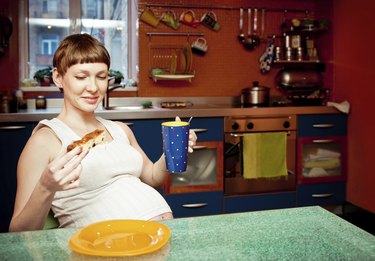
One of the advantages to labor induction is that you can plan ahead and prepare yourself mentally and physically for your induction. If you require an induction of labor for medical reasons or because you are past your due date, your midwife or doctor will discuss with you the method of induction, the risks and what you should eat before you come to the hospital. The types of food you can eat depends on the reasons for your induction, how long labor may take and the likelihood of having a cesarean section.
High-Risk Inductions
Video of the Day
Some women present for induction of labor and are at extremely high risk of requiring a cesarean section. For example, if your baby is breech and your doctor is going to turn the baby head-down immediately before inducing your labor, you should not eat or drink anything after midnight before coming to the hospital. If the baby does not turn or if he shows signs of distress, you may require an urgent cesarean section.
Video of the Day
Moderate Risk Inductions

Many inductions occur because the baby is not growing well or because the mother has high blood pressure. While a cesarean section may still occur if you are in this situation, you will likely have many hours of induction and should expect to progress and have a vaginal delivery. Both the March of Dimes and the American Academy of Family Physicians advise women to eat only light foods, such as broth or gelatin, in small amounts prior to induction of labor.
Lower Risk Inductions

While all inductions carry some risk, certain situations are lower risk than others. For example, if you are planning natural childbirth and know you are 4 centimeters dilated before your induction, your healthcare provider may okay having a regular breakfast before coming in. In addition, some inductions may take days, especially if your cervix is long and closed. If your provider thinks you will need medicine to ripen your cervix, she may recommend that you eat a regular meal before you come in.
Special Considerations

If you have diabetes, talk with your provider about what you should eat and whether you should take your diabetes medication before admission. For women who can eat a regular meal before arriving to the hospital, remember that many laboring women experience nausea and vomiting in the transition phase of labor. Avoid eating heavy, fatty or fried foods before your induction.